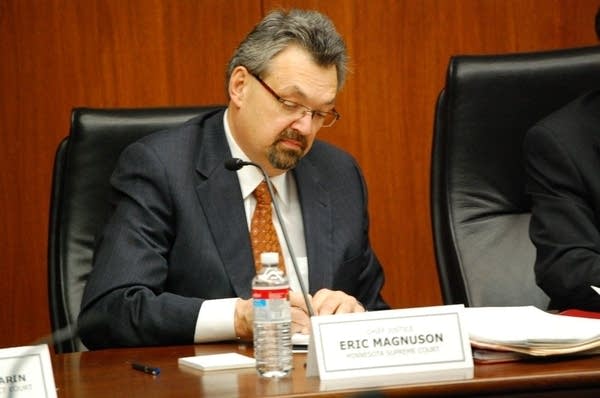How a legal challenge would work
Go Deeper.
Create an account or log in to save stories.
Like this?
Thanks for liking this story! We have added it to a list of your favorite stories.

The Coleman campaign has seven days to essentially appeal the Canvassing Board's decision certifying Franken the winner of the Senate recount.
Coleman can raise the same questions about the ballots as he did in the past few weeks. But now he faces a different legal path, which will most likely start with a three-judge panel appointed by Minnesota's Chief Justice Eric Magnuson.
Coleman would file the lawsuit in Ramsey County, but there's nothing in state law that says Magnuson has to appoint Ramsey County judges to hear the dispute.

There's one potential snarl in Magnuson choosing the three-judge panel -- he also was a member of the state Canvassing Board. To ensure the perception of a cleaner-looking process, Magnuson could ask another justice to choose the panel.
Turn Up Your Support
MPR News helps you turn down the noise and build shared understanding. Turn up your support for this public resource and keep trusted journalism accessible to all.
He could also follow in a previous chief's footsteps. During the tight gubernatorial race between Karl Rolvaag and Elmer Andersen in 1962, Minnesota Chief Justice Oscar Knutson gave the campaigns a list of all the district judges and told them to choose a panel.
Tom Swain, Andersen's chief of staff and campaign manager at the time, remembered Knutson's orders.
"'You guys sequester yourselves in this room and spend as long as necessary going over every one of the 54 district judges in Minnesota. You come up with three that you can agree upon, and I'll make sure they show up -- short of being on their death bed,'" Swain recalled.
The three judges in this case will function as a trial court, and decide only those complaints brought before them by the Coleman campaign and any others the Franken campaign may raise.
The panel will find facts and apply the law. If they disagree, majority rules. The unhappy party could appeal the panel's decision to the Minnesota Supreme Court.
Once the Supreme Court rules, it would send its decision, all files and proceedings to the presiding officer of the U.S. Senate.
But political scientist Guy Charles, a visiting election law professor at Duke University, says there's also a chance that Coleman may take a cue from the Bush v. Gore 2000 election contest and also file a challenge in federal court.
"You saw the Bush campaign proceed on two fronts. There were lawsuits that were filed in federal court, and there were lawsuits that were filed in state court," said Charles. "And that's also a possibility [in this case], that you could file a lawsuit in federal district court and you could file an election contest in state court."
The mere mention of Bush v. Gore raises the specter that the U.S. Supreme Court could get involved in Minnesota's case. Several election law experts say that isn't likely, because the Supreme Court usually stays out of state election law contests. Nevertheless, they say it's still an outside possibility.




